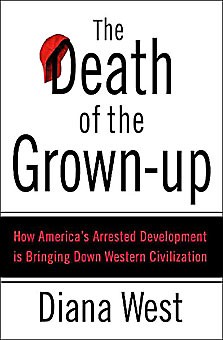If you expect to completely agree with every word written in the books you read, perhaps this one isn’t for you. But if you can accept a little criticism and read with a questioning mind, then Diana West’s new book, “”The Death of the Grown-Up: How America’s Arrested Development Is Bringing Down Western Civilization,”” makes for thought-provoking material.
West examines the historical and cultural tendencies, which have created a world in which adults often fail to act with the responsibility of previous generations. Her examples include statistics on how many adult men play video games, the percentage of “”Sponge Bob Squarepants”” viewers who are over 25 and numbers for how many American adults will move back in with their parents.
Most of her findings don’t come as much of a surprise, especially to the college community where living in the in-between stage of adulthood and childhood is supported and encouraged by things like dorm-room living. Surely, somewhere in this book, West will disapprove of something you are guilty of, whether it is wearing wrinkled clothes, watching Cartoon Network or sporting flip-flops, not shined shoes, daily (she’s got us all, there).
“”The Death of the Grown-Up: How America’s Arrested Development is Bringing Down Western Civilization””
Diana West – St. Martin’s Press
5 stars
$23.95
Part of what West focuses on in “”The Death of the Grown-Up”” is the rise of the teenage group, which did not even have the name “”teenage”” to give itself until the 1940s. This group, West asserts, has the most control over our culture, including fashion, music, movies and even language. She explains the rise of this phenomenon and dates it back to post-World War II America with the fame of such stars as Elvis Presley and Marilyn Monroe, both frozen eternally in youth.
West is strong in her promotion of family values and describes how the failure of Americans to grow up is putting strain on the typical family structure. West discusses the alternative parenting techniques of today, which includes Moms who dress like their daughters, Dads who bond with their sons over a game of Halo and the practice of parents accompanying their children to punk concerts.
These types of parents, West says, rarely inspire respect from their children and as such have no control over problematic behavior. Many of these problems West blames on modern liberalism, which she argues puts emphasis on equality of outcomes rather than of opportunities and promotes personal gratification, which, in view of the school system, contributes to forever-young syndrome by failing to give school children a proper set of rules.
This book, though critical of contemporary American culture, is critical for the purpose of informing and improving the general public. Forward-thinking readers who are able to examine West’s writing without taking offense will enjoy “”The Death of the Grown-Up”” greatly and perhaps gain something from the personal reflection the book inspires – though I doubt anyone will be giving up their flip-flops just yet.









